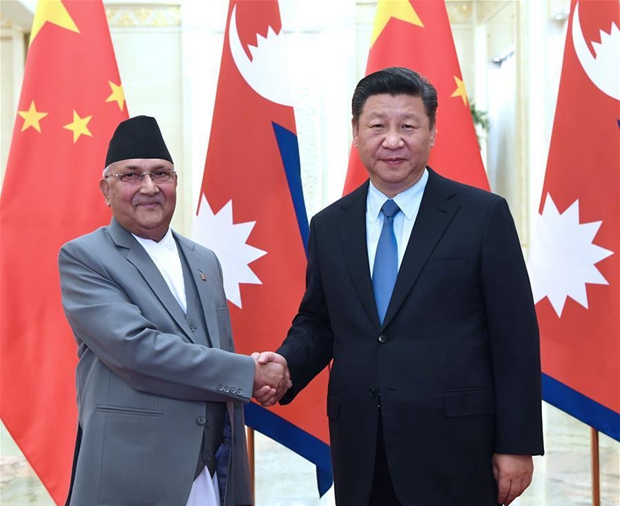Nepal, China forge comprehensive partnership
- By Ritu Raj Subedi
 0 Comment(s)
0 Comment(s) Print
Print E-mail China.org.cn, July 9, 2018
E-mail China.org.cn, July 9, 2018

Upon completing his visit to India in the first week of April, Nepalese Prime Minister KP Sharma Oli termed it "highly successful and significant" in building mutual trust with the southern neighbor.
Oli was highly upbeat about the outcomes of his fence-mending India trip, and even his euphoric body language gave an inkling to some geopolitical watchers that perhaps he had tilted towards India and would give short shrift to scores of agreements reached with China.
But PM Oli proved his skeptics wrong, demonstrating that he wants to execute independent and balanced foreign policies, and will take both neighbors into confidence to achieve his central goal of national prosperity.
Oli's six-day visit to China, from June 19 to 24, not only renewed traditional and friendly relations with the northern neighbor, but it also generated momentum inChina-Nepal ties, laying a solid foundation to boost cooperation in the fields of connectivity, energy production, agriculture, investment, infrastructure development, trade and people-to-people relations.
The two neighbors agreed to "promote the China-Nepal comprehensive cooperative partnership featuring ever-lasting friendship." The visit was crucial in implementing the 10-point accords PM Oli had signed with the Chinese government during his first premiership in 2016.
They agreed to expedite implementation of the memorandum of understanding on cooperation under the Belt and Road Initiative to enhance connectivity that encompasses vital components such as ports, roads, railways, aviation and communications within the overarching framework of the Trans-Himalayan Multi-Dimensional Connectivity Network.
In yet another landmark gain, the two nations signed a deal of Cooperation in Railway Connectivity, which the joint statement described as "the most significant initiative in the history of bilateral cooperation" and which is believed to "herald a new era of cross-border connectivity between the two countries."
The proposed Kerung-Kathmandu railway is a significant step towards implementing the trade and transit agreement reached between the two nations in 2016. Bringing Chinese rail to Nepal has now become a dream of Nepalis, so as to cut excessive dependency on India. Today it has been described as the vehicle of ensuring economic sovereignty and national dignity of Nepalis, in addition to generating positive geopolitical repercussions for their country.
The two nations are in negotiation to finalize the financial modality to construct the railway. Nepal has sought Chinese grants to build the multi-billion dollar project. There are three modalities – grants, soft loans and composite financing, including natural resources exchange. It will be even better if Nepal invests in it as well, along with the Chinese grants, to cultivate a sense of ownership.
Nepal and China have recognized each other's visions for development. Nepal has acknowledged that Xi Jinping Thought on Socialism with Chinese Characteristics for a New Era will enable Chinese people to realize the two centenary goals and build China up to a great modern socialist country.
In a similar manner, the Chinese government has also expressed confidence that under the leadership of Prime Minister Oli, Nepal will be able to realize its goal of "Samriddha Nepal, Sukhi Nepali" ("Prosperous Nepal, Happy Nepali") and achieve political stability, social harmony and economic prosperity for the people of Nepal.
This sort of understanding will go a long way in cementing their bilateral bonhomie. China's recognition of Oli's development motto provides clear indication that China not only respects the sovereignty of its small neighbor, but is also committed to lifting its vast population out of poverty and underdevelopment.
The visit carries other geopolitical meanings, too. In Nepal's PM, the Chinese leaders find a reliable friend to defend a rules-based multilateral trading system – at a time when the U.S. under Donald Trump is hell-bent on destroying it.
Nepal and China have agreed to "enhance coordination and cooperation within SCO, SAARC and other regional cooperation mechanisms." This understanding has regional ramifications, given that India is trying to make the SAARC redundant so as to isolate its arch-foe Pakistan.
Nepal's deepening engagement with China lifts the former's confidence to deal with foreign policy challenges. This will enable the Himalayan nation to keep Western meddling at bay and increase its say in regional and global forums to advance its own legitimate interests.
Ritu Raj Subedi is an associate editor of The Rising Nepal.
Opinion articles reflect the views of their authors, not necessarily those of China.org.cn.






Go to Forum >>0 Comment(s)